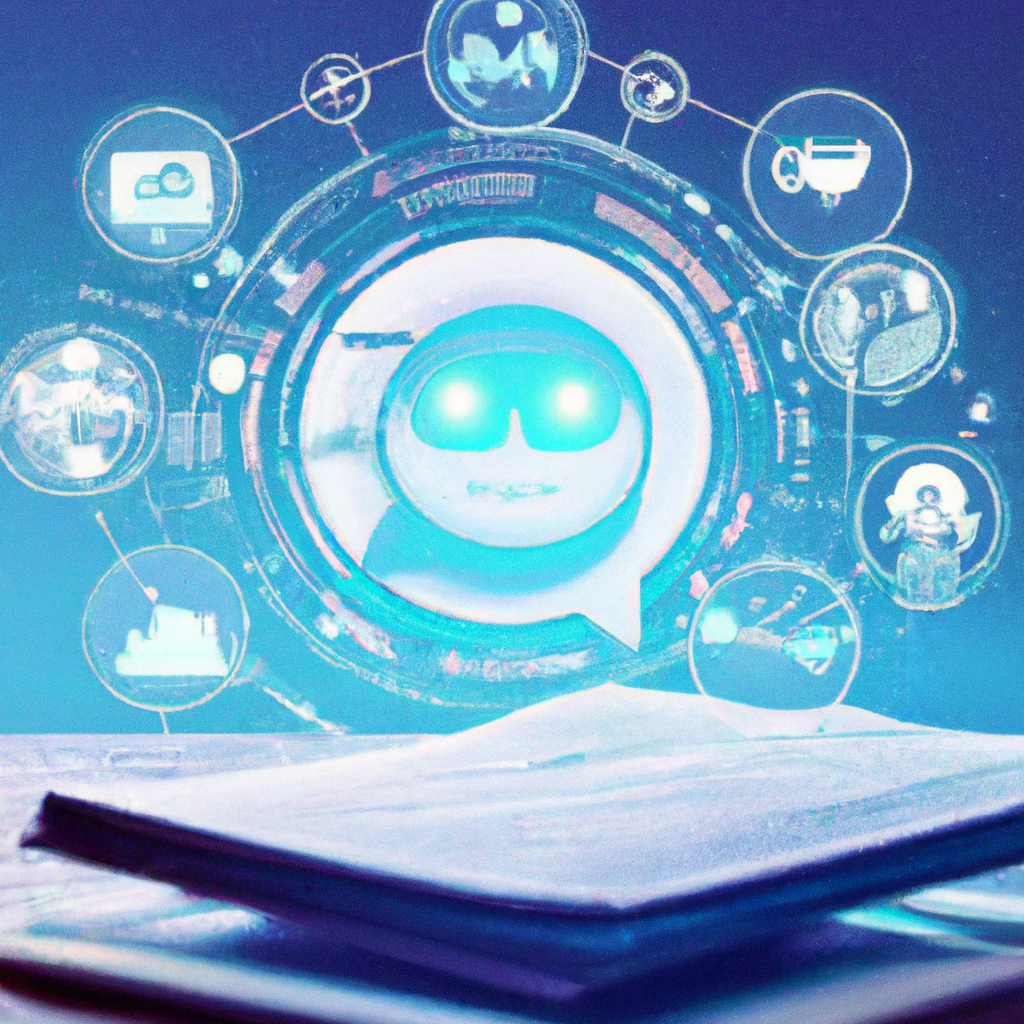Imagine having a powerful tool that not only helps you reach out to potential customers, but also ensures that your interactions remain compliant with all necessary regulations. Enter AI chatbot builders – the innovative solution to effortlessly navigating the complex world of compliance and regulatory requirements. With their advanced algorithms, these chatbot builders have the potential to revolutionize the way businesses engage and communicate with their audience. In this article, we explore the exciting possibilities that AI chatbot builders bring to the table and how they can elevate your business to new heights of success.
Overview of AI chatbot builders
AI chatbot builders are a type of software tool that allows businesses to create and deploy chatbots powered by artificial intelligence. These chatbots are designed to simulate human conversation and provide automated responses to user inquiries. AI chatbot builders utilize various technologies, such as natural language processing (NLP) and machine learning, to understand and interpret user input and generate appropriate responses.
Definition of AI chatbot builders
AI chatbot builders are software platforms that enable businesses to build, customize, and deploy chatbots with artificial intelligence capabilities. These chatbots can interact with users through various channels, such as websites, messaging applications, or voice assistants. The AI capabilities of chatbot builders allow them to understand and respond to user queries in a conversational and human-like manner.

How AI chatbot builders work
AI chatbot builders leverage advanced technologies to understand and respond to user inquiries. They use NLP algorithms to analyze the user’s input, extract relevant information, and determine the intent behind the query. Based on this analysis, the chatbot generates an appropriate response and delivers it to the user. The chatbot builder also allows businesses to train and improve the chatbot’s performance over time by incorporating machine learning algorithms.
Benefits of using AI chatbot builders
Using AI chatbot builders offers several benefits for businesses seeking compliance and regulatory requirements. Firstly, these chatbots can automate various compliance processes, such as providing information about regulations or guiding users through compliance procedures. This automation saves time and resources for businesses, allowing them to focus on more strategic tasks.
Secondly, AI chatbot builders can provide accurate and up-to-date information on compliance and regulatory requirements. These chatbots can access and analyze large volumes of data in real-time, ensuring that the information provided to users is accurate and reliable. This helps businesses stay informed about the latest regulations and guidelines.
Lastly, AI chatbot builders ensure consistent adherence to regulations by providing standardized responses and guidance to users. By incorporating the specific compliance rules and requirements into the chatbot’s programming, businesses can ensure that users receive consistent and compliant information and support.

Understanding compliance and regulatory requirements
Compliance and regulatory requirements refer to the rules, guidelines, and standards that businesses must adhere to in order to operate legally and ethically. These requirements vary depending on the industry and jurisdiction, covering areas such as data protection, financial transactions, and healthcare practices. Compliance is essential for businesses to maintain trust and avoid legal repercussions.
Importance of compliance in businesses
Compliance plays a crucial role in businesses as it helps maintain transparency, trust, and accountability. Compliance with regulations protects businesses from fines, penalties, and litigation, which can have severe financial and reputational consequences. Furthermore, compliance demonstrates a commitment to ethical and responsible practices, enhancing the credibility and reputation of the business in the eyes of customers, investors, and regulators.

Challenges of meeting compliance and regulatory requirements
Meeting compliance and regulatory requirements can pose significant challenges for businesses. Firstly, regulations evolve and change over time, requiring businesses to constantly stay updated and adapt their practices accordingly. This requires continuous monitoring, training, and implementing new procedures, which can be time-consuming and resource-intensive.
Secondly, the complexity and ambiguity of regulations can make interpretation and implementation challenging. Different jurisdictions may have varying interpretations of regulations, leading to uncertainty and confusion for businesses. Additionally, regulations may contain vague language or lack specific guidelines, leaving room for interpretation and potential non-compliance.
Lastly, compliance processes often involve manual efforts, which can be prone to human error. The sheer volume of regulatory requirements and the need for precise documentation and record-keeping increases the risk of mistakes. Manual processes also limit efficiency and scalability, as they require significant time and resources.
The role of AI chatbot builders in compliance
AI chatbot builders can play a crucial role in addressing and mitigating the challenges of compliance and regulatory requirements.
One of the key roles of AI chatbot builders is automating compliance processes. These chatbots can handle repetitive and standardized tasks, such as providing information on regulations or guiding users through compliance procedures. By automating these processes, businesses can save time and resources, allowing compliance teams to focus on more strategic and complex tasks.
Additionally, AI chatbot builders can provide accurate and up-to-date information on compliance and regulatory requirements. These chatbots can access and analyze vast amounts of data in real-time, ensuring that the information provided to users is accurate, reliable, and compliant. This helps businesses stay informed about the latest regulations and guidelines, reducing the risk of non-compliance.
Furthermore, AI chatbot builders ensure consistent adherence to regulations by providing standardized responses and guidance to users. By incorporating the specific compliance rules and requirements into the chatbot’s programming, businesses can ensure that users receive consistent and compliant information and support. This consistency helps businesses avoid errors and discrepancies in compliance-related communications.

Benefits of using AI chatbot builders for compliance
Utilizing AI chatbot builders for compliance offers several benefits for businesses.
One of the key benefits is improved efficiency and cost-effectiveness. By automating compliance processes, businesses can streamline operations, saving time and resources. AI chatbot builders can handle multiple inquiries simultaneously, providing quick and accurate responses to users. This efficiency allows compliance teams to focus on more complex tasks, improving overall productivity.
Another benefit is reduced human error. Manual compliance processes are prone to mistakes, which can lead to non-compliance and potential legal issues. AI chatbot builders eliminate the risk of human error by providing accurate and consistent information to users. These chatbots can also perform checks and validations in real-time, minimizing the chances of compliance breaches.
Furthermore, AI chatbot builders offer 24/7 availability and quick response times. Compliance issues can arise at any time, and users may require immediate answers or support. AI chatbot builders can provide round-the-clock support, ensuring that users receive prompt and relevant assistance. This availability improves customer satisfaction and helps businesses address compliance concerns promptly.
Addressing specific compliance and regulatory areas
AI chatbot builders can be customized to address specific compliance and regulatory areas in different industries.
One such area is data protection and privacy regulations. With increasing concerns over data breaches and privacy violations, businesses need to ensure that they comply with regulations such as the General Data Protection Regulation (GDPR). AI chatbot builders can provide information about data protection requirements, guide users through consent processes, and address privacy concerns in a transparent and compliant manner.
Financial and banking regulations also pose challenges for businesses. Compliance with regulations such as the Dodd-Frank Act or Anti-Money Laundering (AML) requirements is crucial for financial institutions. AI chatbot builders can assist with customer onboarding, fraud detection, and regulatory reporting, ensuring that banks adhere to financial regulations and mitigate compliance risks.
Healthcare and pharmaceutical industries are subject to numerous compliance and regulatory requirements to ensure patient safety and data confidentiality. AI chatbot builders can help healthcare organizations with tasks such as patient data privacy, HIPAA compliance, and drug safety reporting. These chatbots can provide accurate and secure information to patients, healthcare providers, and regulatory bodies.

Considerations when implementing AI chatbot builders for compliance
While AI chatbot builders offer significant benefits for compliance, businesses need to consider certain factors when implementing them.
Data security and confidentiality are critical considerations. AI chatbot builders interact with sensitive and confidential information, such as personal data or financial records. Businesses must ensure that the chatbot’s infrastructure and processes adhere to rigorous security standards to protect user data from unauthorized access or breaches.
Training and monitoring chatbot interactions is another important consideration. Chatbots learn and improve based on user interactions and are subject to biases, errors, or misunderstandings. Ongoing training and monitoring are necessary to ensure that chatbots provide accurate and compliant responses. Businesses should regularly review chatbot interactions and make necessary updates to improve their performance.
Integration with existing systems is also a key consideration. AI chatbot builders need to seamlessly integrate with business systems and databases to access relevant information and provide accurate responses. Integration capabilities, data compatibility, and system scalability should be assessed to ensure smooth implementation and operation of AI chatbot builders.
Potential challenges of using AI chatbot builders for compliance
While the adoption of AI chatbot builders for compliance offers significant benefits, there are some potential challenges to be aware of.
One challenge is the lack of understanding and trust in AI technology. Users may be skeptical about interacting with AI-powered chatbots for compliance-related inquiries. Building trust and providing clear explanations about how the chatbot works and protects user data is essential to overcome this challenge.
Another challenge is ensuring compliance with evolving regulations. Compliance requirements change over time, and AI chatbot builders need to be updated accordingly. Continuous monitoring of regulatory updates, training the chatbot on new regulations, and adapting its responses are necessary to ensure ongoing compliance.
Handling complex and ambiguous queries is also a challenge. Regulations can be complex, and users may ask nuanced or ambiguous questions that the chatbot may struggle to address. Businesses need to design the chatbot’s capabilities to handle such queries, and in cases where the chatbot cannot provide a definitive answer, it should be trained to escalate the query to a human operator.
Successful case studies of AI chatbot builders in compliance
Several industries have successfully implemented AI chatbot builders to enhance compliance processes.
In a case study involving a financial institution, the implementation of an AI chatbot builder improved compliance processes. The chatbot handled routine inquiries about financial regulations, provided information on account opening procedures, and guided customers through compliance requirements. This automation saved time for both customers and compliance teams, resulting in improved operational efficiency and customer satisfaction.
In the healthcare sector, a case study showcased how an AI chatbot builder enhanced patient data privacy. The chatbot educated patients about data protection regulations, answered their queries about accessing or sharing medical records, and provided guidance on consent procedures. This increased patient awareness and ensured compliance with privacy regulations, improving trust and satisfaction.
Furthermore, an e-commerce company implemented an AI chatbot builder to ensure consumer protection. The chatbot addressed customer queries about product safety, refund policies, and warranty information. By providing accurate and consistent information, the chatbot enhanced customer trust and reduced the likelihood of compliance issues related to consumer protection regulations.
Emerging trends in AI chatbot builders for compliance
AI chatbot builders continue to evolve, incorporating new technologies and offering advanced capabilities for compliance.
Advancements in natural language processing (NLP) are a key trend in AI chatbot builders. NLP technology enables chatbots to understand and interpret complex and context-specific language, improving the accuracy and relevance of responses. These advancements enable chatbots to handle more sophisticated compliance-related queries effectively.
Integration with machine learning algorithms is another emerging trend. Machine learning algorithms enable chatbots to learn from past interactions and improve their responses over time. This iterative learning process enhances the chatbot’s performance and accuracy, ensuring compliance with evolving regulations.
The use of chatbot analytics for compliance optimization is also gaining prominence. Analyzing chatbot interactions and user feedback provides valuable insights into potential compliance issues or gaps. By leveraging analytics, businesses can identify areas for improvement, adjust the chatbot’s responses, and proactively address compliance challenges.
Conclusion
AI chatbot builders offer significant potential in assisting businesses with compliance and regulatory requirements. These platforms provide the means to automate compliance processes, deliver accurate and up-to-date information, and ensure consistent adherence to regulations.
By utilizing AI chatbot builders, businesses can improve efficiency and cost-effectiveness, reduce human error, and provide 24/7 availability and quick response times. Addressing specific compliance areas such as data protection, financial regulations, and healthcare requirements becomes more manageable with customizable chatbots.
Implementing AI chatbot builders for compliance requires considerations such as data security, training, and integration with existing systems. Overcoming challenges related to understanding AI technology, evolving regulations, and complex queries is vital for successful implementation.
Numerous successful case studies demonstrate the benefits of AI chatbot builders in compliance across different industries. As emerging trends such as advancements in NLP, integration with machine learning, and chatbot analytics continue to enhance these platforms, the future prospects for AI chatbot builders in regulatory compliance look promising. By embracing AI chatbot builders, businesses can navigate compliance challenges more efficiently and effectively, ensuring legal and ethical practices while building trust and credibility with stakeholders.
